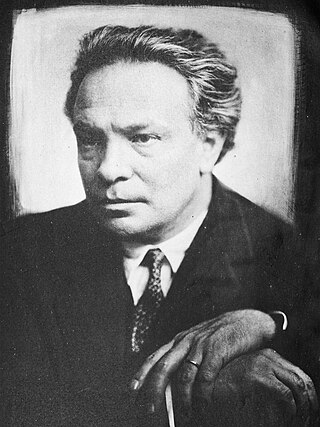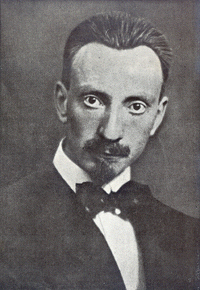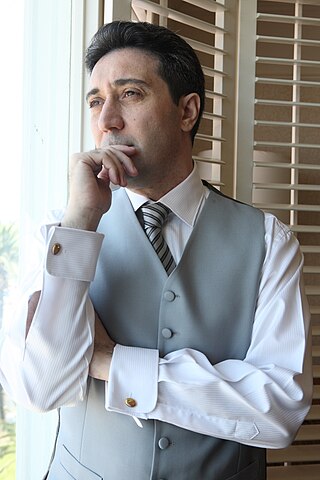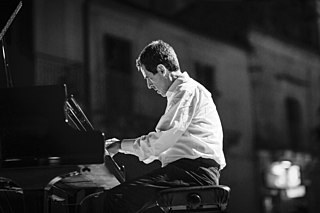
Claudio Abbado was an Italian conductor who was one of the leading conductors of his generation. He served as music director of the La Scala opera house in Milan, principal conductor of the Berlin Philharmonic, principal conductor of the London Symphony Orchestra, principal guest conductor of the Chicago Symphony Orchestra, music director of the Vienna State Opera, founder and director of Lucerne Festival Orchestra, founder and director of Mahler Chamber Orchestra, founding Artistic Director of Orchestra Mozart and music director of European Union Youth Orchestra.
Andrea Gabrieli was an Italian composer and organist of the late Renaissance. The uncle of the somewhat more famous Giovanni Gabrieli, he was the first internationally renowned member of the Venetian School of composers, and was extremely influential in spreading the Venetian style in Italy as well as in Germany.

Luigi Nono was an Italian avant-garde composer of classical music.

Sylvano Bussotti was an Italian composer of contemporary classical music, also a painter, set and costume designer, opera director and manager, writer and academic teacher. His compositions employ graphic notation, which has often created special problems of interpretation. He was known as a composer for the stage. His first opera was La Passion selon Sade, premiered in Palermo in 1965. Later operas and ballets were premiered at the Teatro Comunale di Firenze, Teatro Lirico di Milano, Teatro Regio di Torino and Piccola Scala di Milano, among others. He was artistic director of La Fenice in Venice, the Puccini Festival and the music section of the Venice Biennale. He taught internationally, for a decade at the Fiesole School of Music. He is regarded as a leading composer of Italy's avantgarde, and a Renaissance man with many talents who combined the arts expressively.

Ottorino Respighi was an Italian composer, violinist, teacher, and musicologist and one of the leading Italian composers of the early 20th century. His compositions range over operas, ballets, orchestral suites, choral songs, chamber music, and transcriptions of Italian compositions of the 16th–18th centuries, but his best known and most performed works are his three orchestral tone poems which brought him international fame: Fountains of Rome (1916), Pines of Rome (1924), and Roman Festivals (1928).

Luigi Carlo Filippo Russolo was an Italian Futurist painter, composer, builder of experimental musical instruments, and the author of the manifesto The Art of Noises (1913). Russolo completed his secondary education at Seminary of Portograuro in 1901, after which he moved to Milan and began gaining interest in the arts. He is often regarded as one of the first noise music experimental composers with his performances of noise music concerts in 1913–14 and then again after World War I, notably in Paris in 1921. He designed and constructed a number of noise-generating devices called Intonarumori.

Alfredo Casella was an Italian composer, pianist and conductor.

Gian Francesco Malipiero was an Italian composer, musicologist, music teacher and editor.
Due pezzi, literally meaning "two pieces", is a composition for violin and piano, written by the Italian composer Luciano Berio in 1951. It was published by Suvini Zerboni. The first performance—by pianist Seymour Lipkin and violinist Lorin Maazel, to whom the work is dedicated—took place during the 1952 Tanglewood Music Festival. Berio composed these pieces and three other works in response to meeting Luigi Dallapiccola. As the composer says: "with these works I entered the 'melodic' world of Dallapiccola and these same works allowed me to leave it".
Chamber Music is a composition in three sections for female voice, clarinet, cello and harp by the Italian composer Luciano Berio. It is a setting of three poems from the collection of poetry Chamber Music by James Joyce, whose work was to be a frequent source for Berio. The songs were composed in 1953, and show the influence of Luigi Dallapiccola with whom Berio had studied in 1952 at the Tanglewood Music Center.

Bruno Bettinelli was an Italian composer and teacher.
Valentino Bucchi was an Italian composer.

Alexander Bălănescu is a Romanian violinist, and founder of the Balanescu Quartet.
Lello Voce is an Italian poet, writer, and journalist. He was among the founders of Gruppo 93 and of the six-monthly literary magazine Baldus. He lives and works in Treviso, Veneto.

Intonarumori are experimental musical instruments invented and built by the Italian futurist Luigi Russolo between roughly 1910 and 1930. There were 27 varieties of intonarumori built in total, with different names.

Luigi Dallapiccola was an Italian composer known for his lyrical twelve-tone compositions.

Salvatore Di Vittorio is an Italian composer and conductor. He is the music director and Conductor of the Chamber Orchestra of New York. He has been recognized by Luigi Verdi as a "lyrical musical spirit, respectful of the ancient Italian tradition… an emerging leading interpreter of the music of Ottorino Respighi".
Stanislao Silesu was an Italian composer. His father Luigi was organist at the Cathedral of Santa Clara.
Guglielmo Cinque is an Italian linguist and professor of linguistics at the Ca' Foscari University of Venice. He is one of the leading figures in modern minimalist syntax.

Salvatore Bonafede is an Italian composer and pianist.












